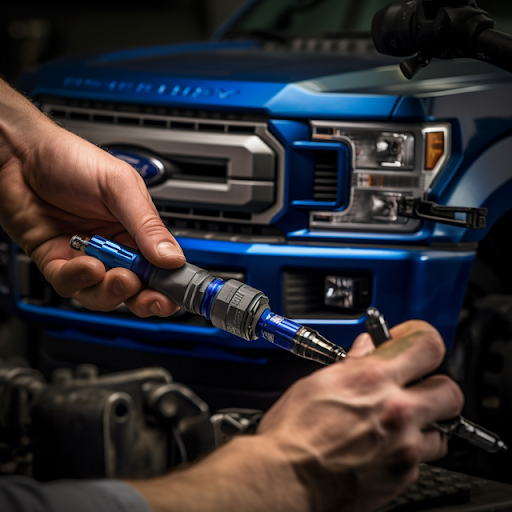Mastering the Art of Diesel Fuel Injection: A Comprehensive Guide to Fuel Injectors and Their Functionality
Diesel engines are known for their efficiency and longevity, which is why they are so popular in heavy-duty machinery and commercial vehicles. However, to keep these engines running at their best, it’s important to understand how the fuel injection system works and what can go wrong if it’s not maintained properly. In this comprehensive guide, we will dive into the world of diesel fuel injectors and their functionality. We will cover different types of injectors, how they work, common issues that arise with them, and most importantly, how you can maintain them to ensure optimal performance. Whether you’re a mechanic or simply an enthusiast looking to master the art of diesel fuel injection, this guide has got you covered.
Introduction to Diesel Fuel Injectors
Diesel fuel injectors are a vital component in the efficient functioning of any diesel engine. These components deliver precisely measured quantities of diesel to the engine, ensuring optimal fuel economy and power output. Understanding the basics of diesel fuel injectors is crucial for anyone who wants to maximise their vehicle’s performance. There are three main types of diesel fuel injectors: mechanical, electronic, and common rail. Each type has its unique characteristics and functionality, making it important to choose the right injector for your specific needs. Additionally, factors like fuel quality, temperature, and pressure can significantly impact the performance and lifespan of your diesel fuel injector. Therefore, proper maintenance and cleaning are essential to ensure optimal functionality and longevity of these critical components.
What are Diesel Fuel Injectors?
An essential component of diesel engines, fuel injectors deliver fuel in a controlled and precise manner. Comprising several parts, including the nozzle, plunger, and delivery valve, these devices ensure that the engine receives the right amount of fuel for optimal performance. Fuel is pressurized and atomized before being sprayed into the combustion chamber where it combines with air to ignite. The quality of diesel fuel injectors can significantly influence engine efficiency and operation. Proper maintenance and cleaning can help extend their lifespan while preventing expensive repairs down the line.
How do Diesel Fuel Injectors Work?
Diesel fuel injectors are a crucial component in your engine’s performance. They work by delivering fuel into the engine’s combustion chamber at high pressure, resulting in efficient combustion and maximum power output. The injector nozzle is precisely engineered to control the spray pattern and the amount of fuel delivered. The engine’s computer regulates their timing and duration based on various parameters such as throttle position, engine speed, and load. Proper maintenance and cleaning of diesel fuel injectors are essential for optimal performance and longevity of your engine. Neglecting them can lead to clogs, blockages, or leaks, which can cause a variety of problems affecting both efficiency and power output.
Types of Diesel Fuel Injectors
In the world of diesel engines, fuel injectors come in a variety of types to suit different needs. Common Rail Injectors are the most widely used type of injector in modern diesel engines. They provide better fuel economy and lower emissions than some of the older systems. Unit Injectors are self-contained systems that combine the injector and high-pressure pump, making them an efficient choice for smaller engines. Rotary Distributor Injection Pumps are an older system still employed in some diesel engines. Electronic Unit Injectors use electronic controls to deliver fuel precisely, while Pintle Injectors are an older design commonly found in smaller diesel engines. Each type has its strengths and weaknesses, so it’s essential to choose the right one for your engine’s needs.
Common Rail Fuel Injectors
The common rail fuel injector is the most widely used type of diesel fuel injector today. It works by creating a uniform pressure in the fuel rail using a high-pressure pump, which then delivers fuel to each injector at the same pressure. This results in better fuel efficiency and lower emissions compared to other types of injectors. Moreover, these injectors offer better control over engine performance as they can perform multiple injections per combustion cycle. Regular maintenance and cleaning are necessary for optimal performance, and clogging can negatively impact their functionality. Hence, it’s essential to keep these injectors well-maintained and clean for efficient engine performance.
Unit Injector System
The unit injector system is a popular choice for heavy-duty diesel engines due to its simplified design. By combining the high-pressure pump and injector into one unit, engine performance and efficiency can be improved as it delivers precise amounts of fuel to each cylinder. However, this system can also be more expensive to repair or replace than other types of injectors. It’s crucial to choose the appropriate fuel injector based on the engine’s specific needs and usage to prevent unnecessary costs and downtime. Proper maintenance and timely inspection can also extend the lifespan of unit injectors, ensuring optimal engine performance.
Common Issues with Diesel Fuel Injectors
Maintaining diesel fuel injectors is essential to prevent various issues that can compromise engine performance and efficiency. Clogging, fuel leaks, poor atomization, electrical problems, and wear and tear are some of the most common issues that can occur with diesel fuel injectors. When contaminants clog or block the injector, it can result in a decrease in power output or acceleration. Fuel leaks can also lead to reduced engine power and increased emissions. Poor atomization affects engine combustion efficiency while electrical problems can cause misfiring and stalling. Routine inspection and maintenance of diesel fuel injectors are crucial to avoid these issues.
Clogging and Blockages
Clogging and blockages are common issues that diesel fuel injectors face. These problems can lead to reduced engine performance, lower fuel efficiency, and even engine failure if not addressed promptly. Sediment buildup, dirty fuel filters, and bacterial growth in the fuel tank are some of the common causes of clogging. Regular maintenance practices such as using high-quality fuel and changing filters can help prevent these issues from arising. However, in severe cases, professional cleaning or replacement may be necessary to restore proper functionality to your diesel fuel injector system.
Leaks and Faulty Seals
Leaks and faulty seals are some of the most common issues that diesel fuel injectors face. It is essential to regularly inspect and maintain your fuel injectors to prevent leaks from occurring. Leaking fuel from the injector can cause poor engine performance, reduced fuel efficiency, and even engine damage. A worn-out or damaged seal can be caused by many factors such as wear and tear, heat, or improper installation. Replacing faulty seals or injectors should be done promptly to avoid further damage to the engine. With proper maintenance, the risk of leaks or faulty seals can be effectively reduced, ensuring optimum performance of your diesel engine.
Maintenance and Inspection of Diesel Fuel Injectors
Regular maintenance and inspection of diesel fuel injectors is crucial for their longevity and optimal performance. Signs of a faulty injector include rough idling, decreased fuel efficiency, and misfires. To prevent such issues, it’s important to use high-quality diesel fuel and filters to avoid clogs and damage to the injectors. A professional technician with experience in diesel engines should regularly inspect and clean the injectors to ensure they are functioning at their best. Neglecting this maintenance can lead to costly repairs or even engine damage, so it’s vital to make sure preventative measures are taken with these crucial components.
Cleaning and Flushing the Fuel Injection System
Regular cleaning and flushing of the fuel injection system is an essential maintenance task that can significantly impact the performance of your diesel engine. Just like changing the oil, cleaning and flushing the injection system ensures that fuel injectors remain free from carbon deposits and impurities, preventing clogging and misfires. This process involves using specialized cleaning solutions to remove harmful build-up from the fuel lines, combustion chambers, and fuel injectors themselves. By doing so, you can reduce emissions, improve fuel efficiency, and extend the lifespan of your engine.
It’s crucial to follow the manufacturer’s recommended interval for cleaning and flushing to prevent damage that could negatively affect engine performance. Consulting with a professional mechanic or referring to your owner’s manual can provide specific instructions for performing this maintenance task. Regular cleaning and flushing can save you money in repair costs over time by prolonging the life of your diesel fuel injector system.
Signs That Indicate Your Fuel Injectors Need Replacement
Regular maintenance and inspection of your diesel fuel injectors are crucial to keep your engine running smoothly. However, there may come a time when replacement is necessary. Signs that indicate your fuel injectors may need replacing include poor fuel economy, rough idling, and reduced engine power. Other symptoms to look out for include black smoke from the exhaust, engine misfires, and a strong gasoline smell. If you notice any of these signs, it’s important to have your fuel injectors inspected by a professional mechanic who can diagnose any issues accurately. Replacing faulty fuel injectors with high-quality replacements can significantly improve engine performance and fuel efficiency, ensuring that your diesel engine runs smoothly for years to come.
Frequently Asked Questions
What is the purpose of a diesel fuel injector?
The purpose of a diesel fuel injector is to deliver precise amounts of fuel to the engine’s combustion chamber. This helps ensure proper fuel atomization for efficient combustion and reduced emissions. Diesel fuel injectors can also be electronically controlled for even more precise control over fuel delivery.
Proper maintenance of diesel fuel injectors is crucial for optimal engine performance and longevity. By keeping them clean and in good condition, you can help ensure that your engine runs smoothly and efficiently.
What are some common problems with fuel injectors and how can they be fixed?
Common fuel injector problems include clogging, leaking, and malfunctioning electrical components. Clogging can often be fixed by cleaning or replacing the injector, which may be caused by debris in the fuel system. Leaking injectors may need to have their seals and O-rings replaced or be replaced entirely.
If there are issues with the electrical components of the injector, a professional mechanic can often repair them or replace them altogether. It’s important to address these issues promptly to ensure optimal engine performance and fuel efficiency.
Are there any maintenance tips to ensure the longevity of fuel injectors?
To ensure the longevity of your fuel injectors, it’s important to follow a few maintenance tips. First, make sure to regularly clean and replace fuel filters to prevent debris from clogging the injectors. Additionally, using high-quality fuel can help avoid the build-up of deposits on the injectors.
It’s also important to avoid running the fuel tank low, as sediment from the bottom of the tank can clog the injectors. Finally, getting regular professional cleaning and inspection of the injectors can help catch any issues early on and prevent more serious problems down the line.
Conclusion
In conclusion, diesel fuel injectors play a critical role in the performance of your vehicle. Understanding how they work and what issues they can face will allow you to identify and fix problems before they become more significant and costly. Regular maintenance and inspection of your fuel injection system will help prevent clogging, leaks, and other common issues. If you suspect that your fuel injectors may need replacement, look out for signs such as decreased fuel efficiency or rough idling. For more information on mastering the art of diesel fuel injection, read our comprehensive guide on fuel injectors and their functionality

